Weathering of rocks and soil formation -> hydrolysis
Hydrolysis
Hydrolysis is a chemical process in which a compound is broken down by the addition of water. This reaction involves the cleavage of chemical bonds in the presence of water molecules, resulting in the formation of two or more new substances.
Key Concepts
- Chemical Bonds: Hydrolysis breaks down chemical bonds within a compound.
- Water Molecules: Water participates in the reaction, providing the necessary components for the breakdown.
- Product Formation: Hydrolysis results in the formation of new substances from the original compound.
- Biological Significance: Hydrolysis is a fundamental process in living organisms, such as in the digestion of food and the breakdown of complex molecules into simpler ones.
Examples of Hydrolysis
There are numerous examples of hydrolysis in both chemical and biological systems:
- Hydrolysis of Salt: When a salt, such as sodium chloride (NaCl), is dissolved in water, it undergoes hydrolysis to form ions.
- Hydrolysis of Carbohydrates: Enzymatic hydrolysis of carbohydrates breaks down starches and sugars into simpler sugars, such as glucose and fructose, during digestion.
- Hydrolysis of Proteins: Proteins can be hydrolyzed into amino acids through the action of enzymes and water.
- Hydrolysis of Lipids: Lipids undergo hydrolysis to form fatty acids and glycerol, which are essential for various cellular functions.
Study Guide
When studying hydrolysis, consider the following points:
- Understand the role of water in the hydrolysis reaction.
- Identify the types of chemical bonds that can be broken through hydrolysis.
- Learn about the enzymes involved in biological hydrolysis reactions.
- Explore the significance of hydrolysis in different biological processes, such as digestion and cellular metabolism.
- Practice identifying examples of hydrolysis in various chemical and biological contexts.
[Hydrolysis] Related Worksheets and Study Guides:
.◂Science Worksheets and Study Guides Seventh Grade. Weathering of rocks and soil formation
Study Guide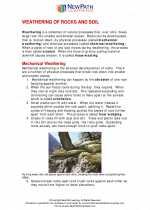 Weathering of rocks and soil formation
Weathering of rocks and soil formation  Activity Lesson
Activity Lesson Weathering of Rocks
Weathering of Rocks  Worksheet/Answer key
Worksheet/Answer key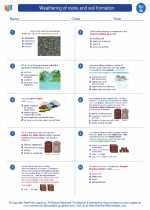 Weathering of rocks and soil formation
Weathering of rocks and soil formation  Worksheet/Answer key
Worksheet/Answer key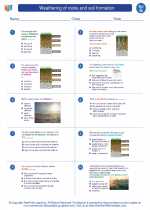 Weathering of rocks and soil formation
Weathering of rocks and soil formation  Worksheet/Answer key
Worksheet/Answer key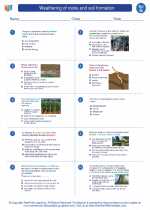 Weathering of rocks and soil formation
Weathering of rocks and soil formation  Worksheet/Answer key
Worksheet/Answer key Weathering of rocks and soil formation
Weathering of rocks and soil formation  Vocabulary/Answer key
Vocabulary/Answer key Weathering of rocks and soil formation
Weathering of rocks and soil formation  Vocabulary/Answer key
Vocabulary/Answer key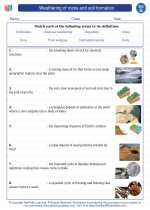 Weathering of rocks and soil formation
Weathering of rocks and soil formation  Vocabulary/Answer key
Vocabulary/Answer key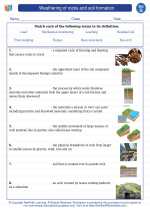 Weathering of rocks and soil formation
Weathering of rocks and soil formation  Vocabulary/Answer key
Vocabulary/Answer key Weathering of rocks and soil formation
Weathering of rocks and soil formation 

 Activity Lesson
Activity Lesson
 Worksheet/Answer key
Worksheet/Answer key
 Worksheet/Answer key
Worksheet/Answer key
 Worksheet/Answer key
Worksheet/Answer key
 Worksheet/Answer key
Worksheet/Answer key
 Vocabulary/Answer key
Vocabulary/Answer key
 Vocabulary/Answer key
Vocabulary/Answer key
 Vocabulary/Answer key
Vocabulary/Answer key
 Vocabulary/Answer key
Vocabulary/Answer key

The resources above cover the following skills:
LIFE SCIENCE
Unity and Diversity
Analyze and interpret data for patterns of change in anatomical structures of organisms using the fossil record and the chronological order of fossil appearance in rock layers.